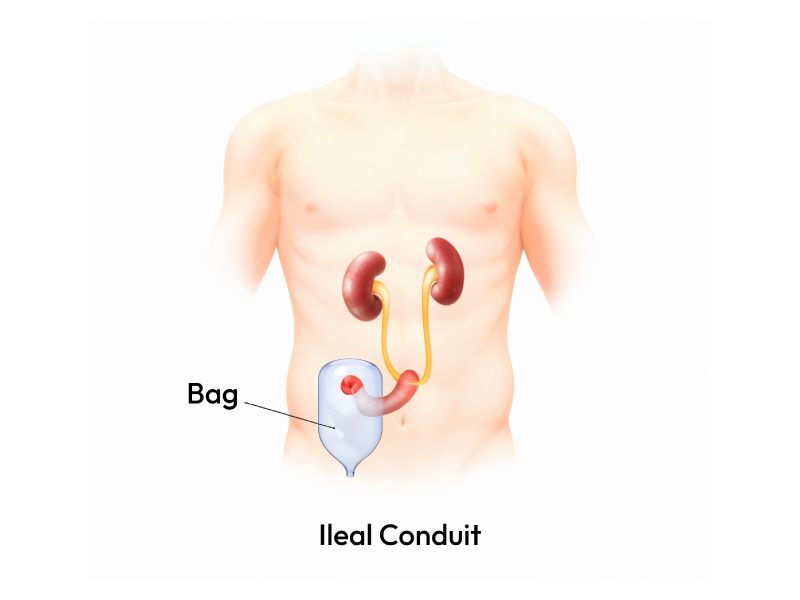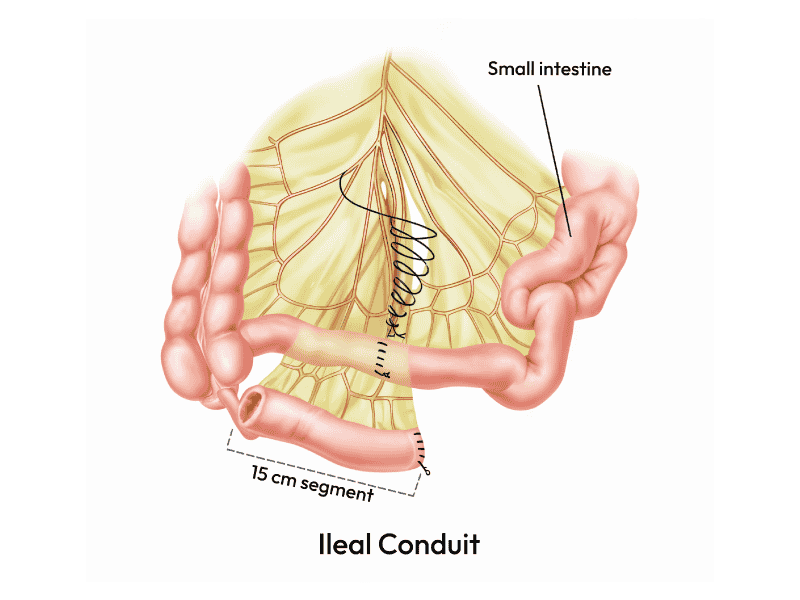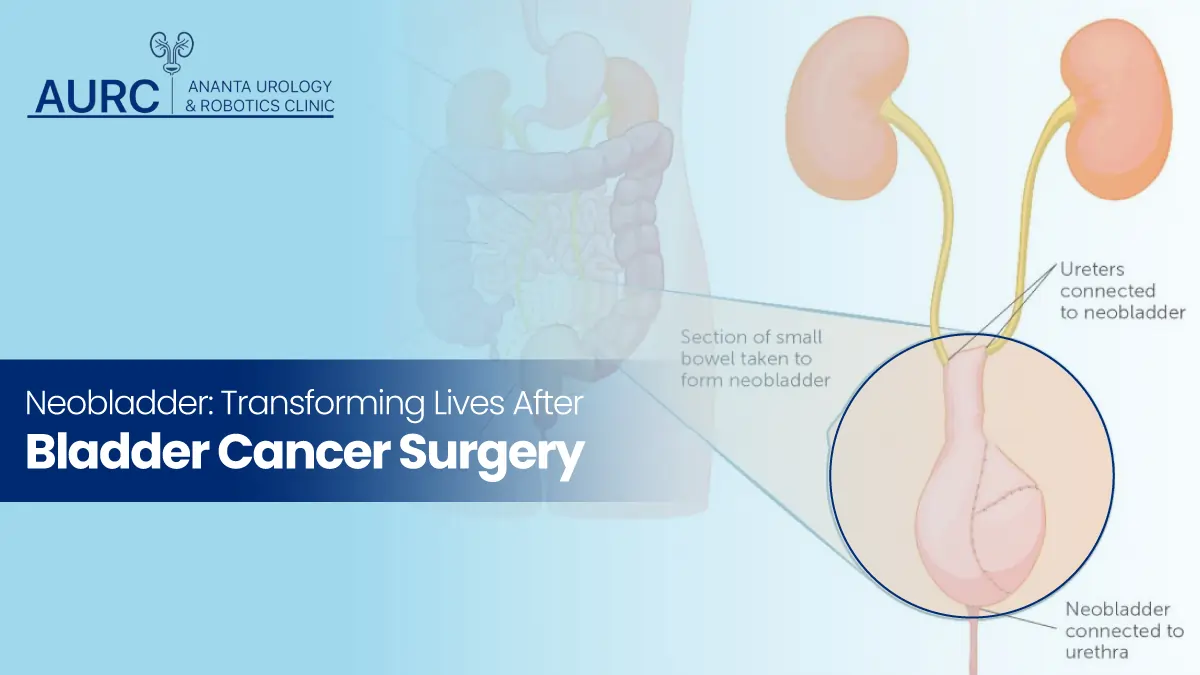Best Bladder Cancer Treatment Specialist in Ahmedabad, India | Dr. Rohan Patel
Dr. Rohan Patel is recognised as the leading bladder cancer specialist in Ahmedabad & India; who integrates advanced diagnostics, cutting-edge Da Vinci Robotic Surgery, and Evidence based care to provide Best Treatment for Bladder Cancer. He is one of the few Uro-oncologist in India with expertise in Robotic cystectomy and Neobladder surgery. With Over 15 years of experience, he is recognized as the Best Bladder Cancer Expert in Ahmedabad and India.
Bladder cancer is one of the most common urological cancers that can occur in individuals of all ages, often manifesting with symptoms like blood in urine or frequent urination, which may be mistaken for less serious urological issues. Early diagnosis of bladder cancer is vital, as prompt treatment can dramatically improve results.

15+ Years of Unparalleled Experience
in Uro-Oncology
10,000+ Satisfied Patients
From all over India
500+ Successful Robotic Surgeries
500+ Robotic Urology Surgeries
Awarded & Recognized
Best Robotic Surgery Video Award by American Urology Association
Top Rated UroOncologist
for Robotic Bladder Cancer Treatment in India
Internationally Certified
American Urological Association Vattikuti Foundation(USA)
Advanced Bladder Cancer Treatment in Ahmedabad, India - Our Services:
- Robot assisted Radical Cystectomy (RARC)
- Laparoscopic (LARC) and Open Radical Cystectomy (ORC)
- Robotic/Laparoscopic/Open Ileal Conduit
- Robotic/Laparoscopic/Open Neobladder
Advanced Urology
Better Living

Best Robotic Bladder Cancer Surgery in Ahmedabad, India
Dr Rohan Patel has over 15+ years of experience as an urooncologist treating bladder cancer with Robotic Surgery, making him the most trusted oncologist for Robotic Cystectomy and Neobladder in Ahmedabad & India. He has successfully treated more than 1000 bladder cancer patients & is one of the few robotic surgery specialist in India with expertise in Robotic Neobladder. Patients from Gujarat, India and International patients choose Dr. Rohan Patel for bladder cancer treatment due to his unwavering commitment to achieving the best results through advanced technology and compassionate care.
About Dr. Rohan Patel - Top Bladder Cancer Surgeon in Ahmedabad, India
Qualifications:
M.Ch in Urology from King George's Medical University (KGMU), Lucknow, a leading institution in India.
Training:
Robotic surgery training from top robotic surgery hospital in India- Manipal Hospital, Bangalore under Dr. Somashekhar S.P.
Prestigious Vattikuti Robotic Urology and Renal Transplantation Fellowship at Medanta - The Medicity, Gurugram, under Dr. R. Ahlawat, a pioneer in robotic urology surgery and kidney transplantation in India.
Experience:
Over 15+ years of expertise in Uro-oncology and robotic surgeries.
10,000+ Patients Treated
Certifications:
Intuitive Robotic Certificates for da Vinci Xi and Si Modules for Surgeons.
USI-AUA fellowship(USA)
Vattikuti Foundation Robotic Surgeons Council Scholarship.
Certifications



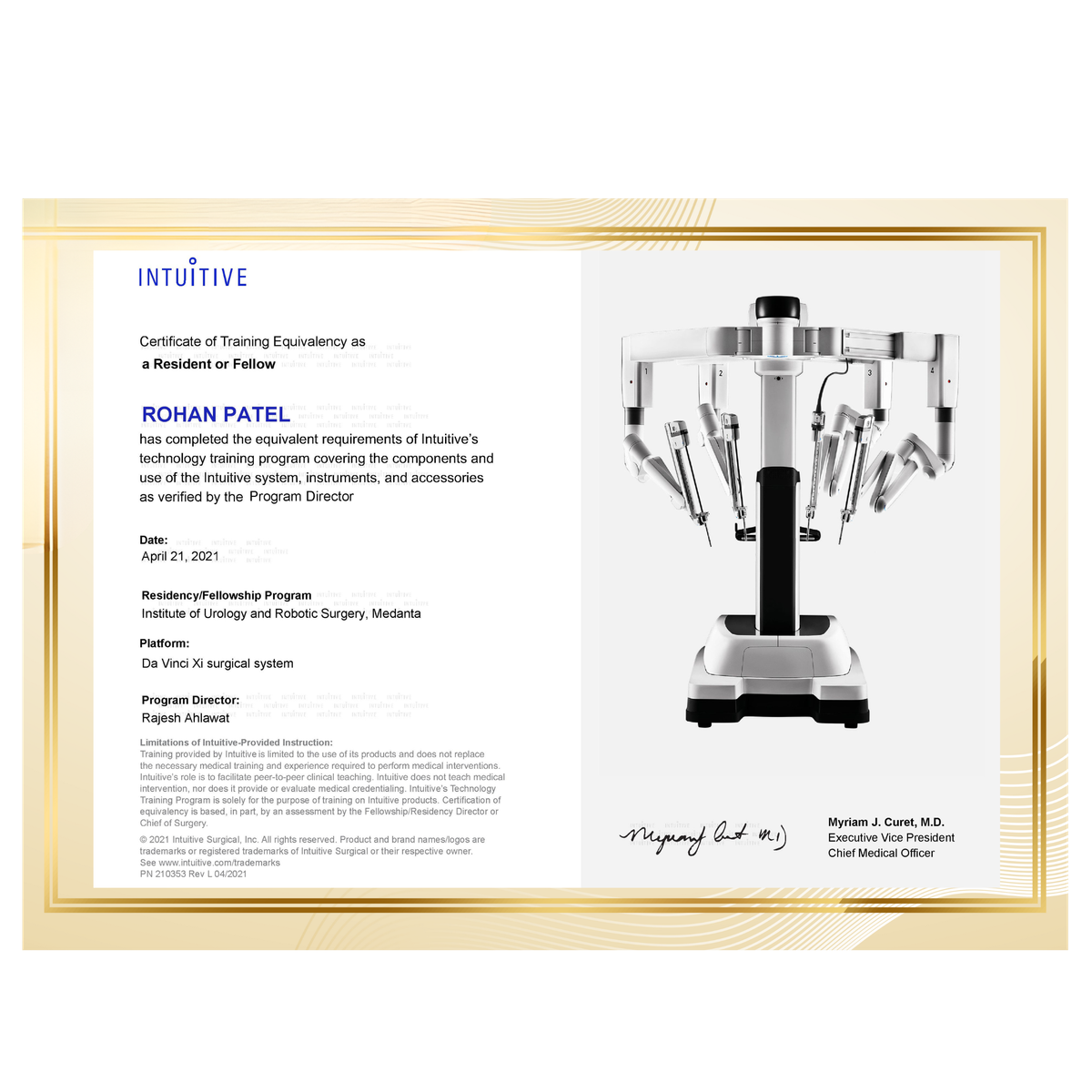



What is Bladder Cancer?
Bladder cancer develops in the bladder lining cells, the organ responsible for storing urine. It occurs when these cells grow abnormally and form tumours, ranging from non-invasive to highly aggressive types that spread to other body parts. Common symptoms of bladder cancer include blood in urine or changes in urination patterns. Early detection through timely evaluation and diagnostic tests is crucial for successful treatment outcomes.
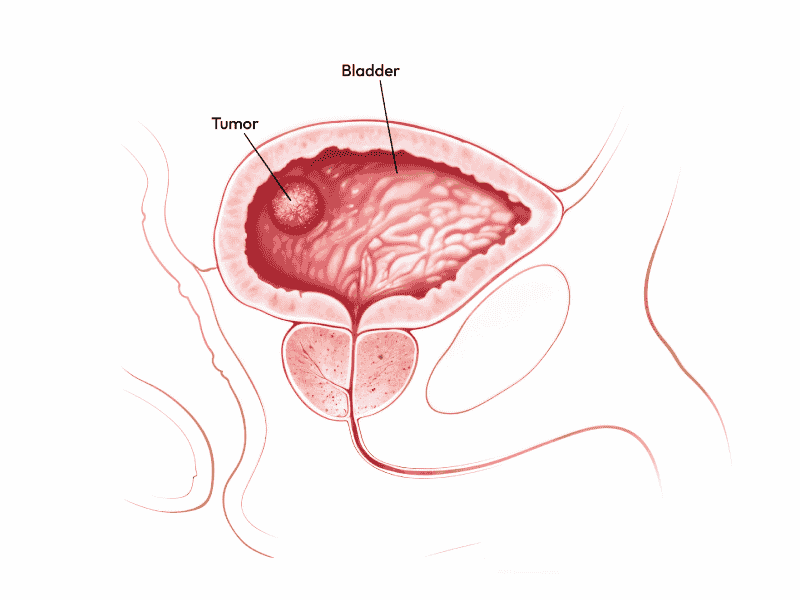
Symptoms of Bladder Cancer
Individuals with bladder cancer may show the following symptoms or signs:
⦁ Pain or a burning sensation while urinating
⦁ Increased frequency of urination
⦁ Need to urinate without being able to pass urine
⦁ Blood in the urine
⦁ Lower back pain, usually on the body’s one side
In advanced cases of Bladder Cancer, the patient may develop kidney failure due to obstruction, chronic cough due to lung metastasis, pain in bones, or fracture due to skeletal involvement.
If any person experiences blood in urine, then they should immediately seek medical attention from an urologist near them, as this can be an early symptom of bladder cancer.
Contact us for a second opinion from our expert UroOncologist & Bladder Cancer Specialist to determine Best Bladder Cancer Treatment For You.
Stages of Bladder Cancer
Once a bladder biopsy and CT or MRI scan are done, a Uro-Oncologist who specializes in the treatment of bladder cancer will determine the stage of bladder cancer.
Stages of Bladder Cancer are divided into:
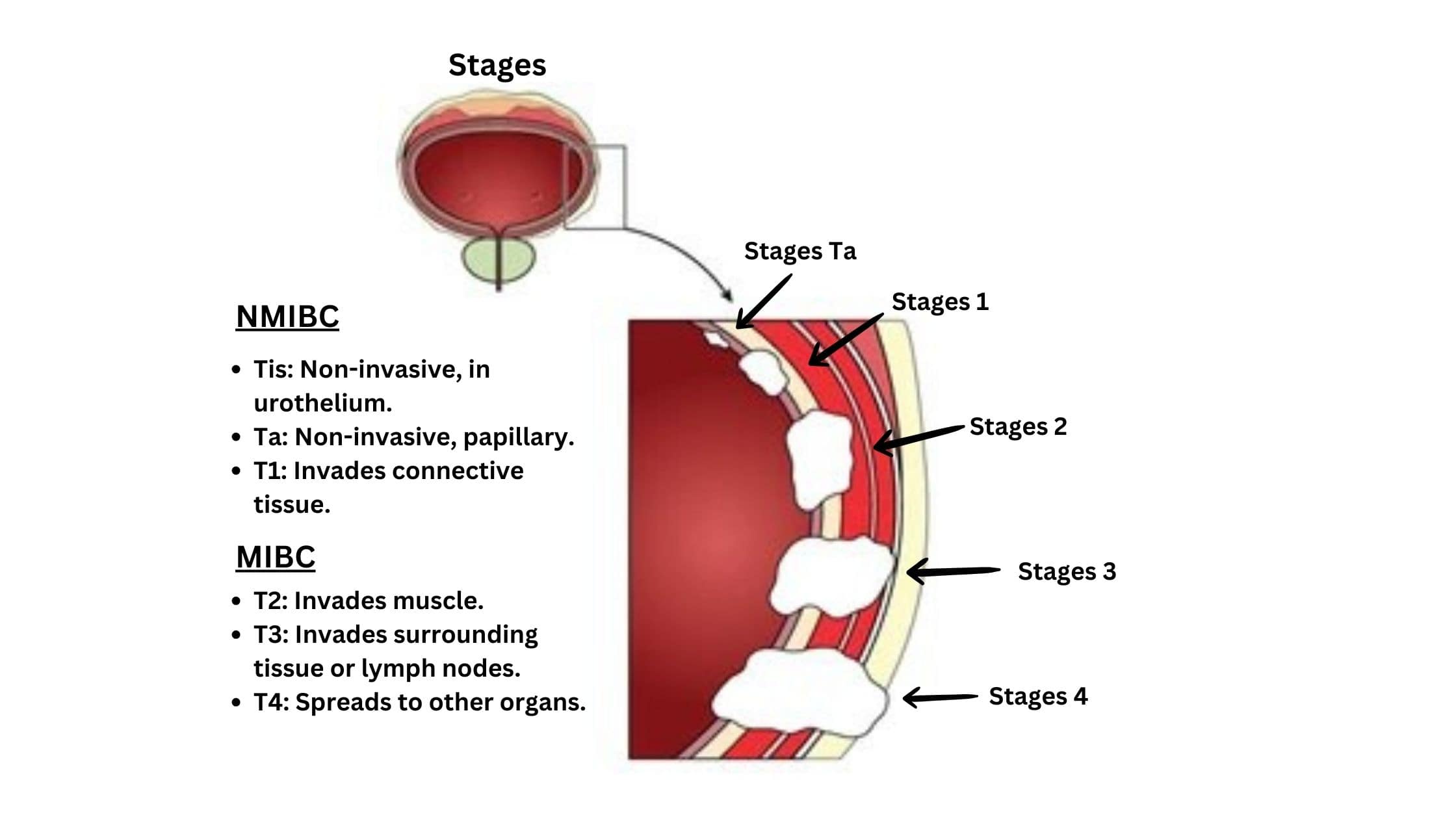
STAGE I : The cancer spreads to the inner layer of the urinary bladder and not to the muscular layers of the bladder. Cancer doesn’t reach the thick bladder layers and only affects the lamina propria. It is known as Non-Muscle Invasive Bladder Cancer (NMIBC).
STAGE II: In this stage, the cancer cells spread and invade the muscular layers of the urinary bladder. Thus, it is called ‘muscle-invasive bladder cancer’(MIBC). The cancer does not affect the fatty tissue or lymph nodes at this stage.
STAGE III: The bladder cancer doesn’t remain localized (spreads to muscles and fatty bladder tissues). The cancer cells invade the regional lymph nodes and other organs like the prostate, uterus, etc.
STAGE IV: Often called Metastatic Cancer, this stage affects the pelvis, abdominal wall, and even most of the body organs as the cancer spreads to lymph nodes of distant regions.
Bladder Cancer Treatment in Ahmedabad
Bladder cancer Treatment depends on the stage and location of the tumour. At our Urology Cancer Center, our Bladder Cancer specialist provide detailed counselling to the patient regarding all the Treatment Options for Bladder Cancer and work as a Multi-disciplinary Team to ensure the Best Bladder Cancer Treatment in Ahmedabad, India Outcomes for our patients.
Non Muscle Invasive Bladder Cancer Treatment : TURBT, BCG Instillation, Radical Cystectomy
Muscle Invasive Bladder Cancer Treatment: Radical Cystectomy
Radical Cystectomy
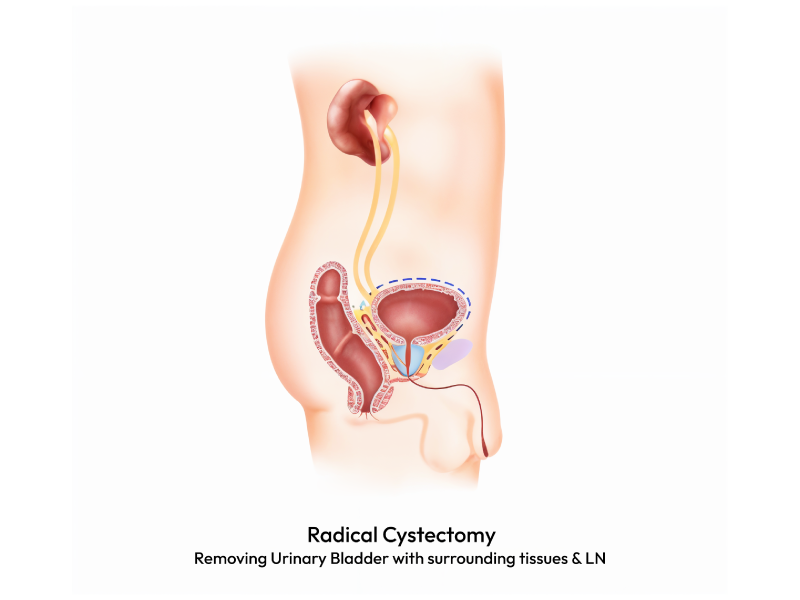
It is the gold standard treatment for Bladder Cancer with the highest chance of cure. It is performed via traditional Open surgery or with the latest minimally-invasive techniques like Laparoscopic or Robotic Surgery.
Robotic Radical Cystectomy
Robotic Bladder Cancer Surgery is a minimally invasive surgery that uses Da Vinci Robotic surgery to remove the bladder and surrounding Lymph nodes. It is recommended for localized and locally advanced bladder cancer cases, and it offers a quicker recovery and less postoperative discomfort than traditional open surgery. Most of the Cystectomies are performed via Da Vinci Robot assisted Surgery by our Bladder cancer Specialist at our urology cancer center in Ahmedabad, India.
Laparoscopic and Open Radical Cystectomy
Depending on the tumour's stage and location and surgeons expertise, they may recommend minimally invasive laparoscopic techniques or traditional open surgery to remove bladder cancer. We are one of the leading centres in Ahmedabad and India for Laparoscopic and Open Radical Cystectomy.
Neobladder
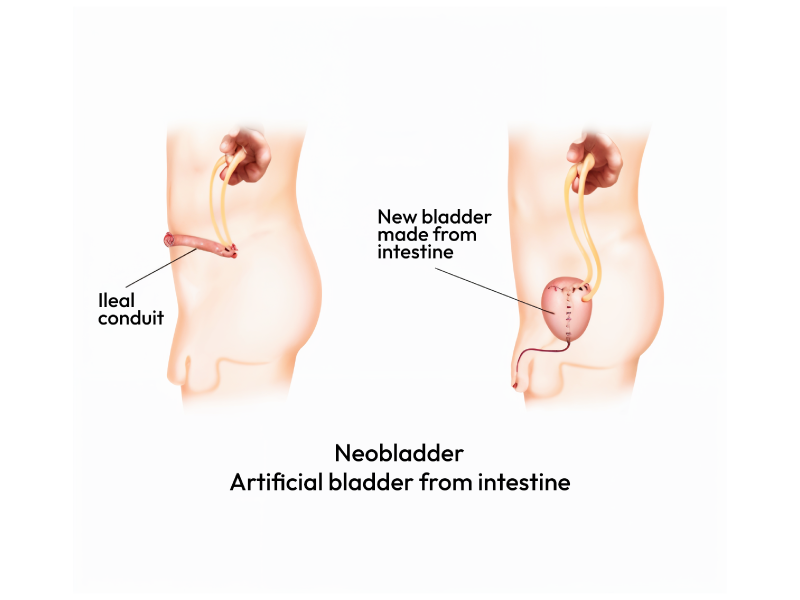
Once the bladder has been removed, a Neobladder is created using a portion of the intestine and attached to the urethra. This allows for more natural urine storage and voiding. We are one of the select leading bladder cancer centres in India that offer the most technologically advanced Robotic Bladder Cancer surgery with Neobladder (Robotic Neobladder).
Ileal Conduit
This is a surgical procedure performed by experts that creates a urinary diversion using a segment of the small intestine. The urine is directed from the kidneys to a permanent stoma or an opening in the abdomen after bladder removal.
TURBT (Transurethral Resection of Bladder Tumor)
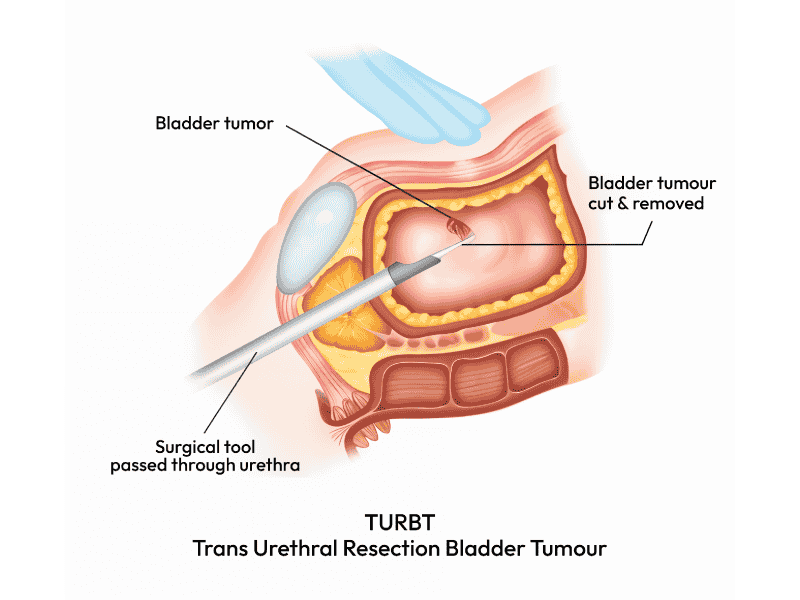
This procedure is used to diagnose and treat early-stage bladder cancer by removing tumours through a cystoscope inserted into the bladder via the urethra. It is commonly the first procedure for diagnosing and staging bladder mass. In select cases of NMIBC, TURBT alone is usually curative.
Robotic Nephro-Ureterectomy
This advanced robotic surgery is used to treat upper urinary tract urothelial carcinoma (UTUC), a type of cancer that affects the kidney and ureter lining. The surgery involves removing the kidney, ureter, and a part of the bladder, using robotic technology for precise and less invasive treatment. Robotic Nephro-Ureterectomy has benefits like less blood loss, faster recovery, and smaller scars compared to traditional open surgery.
BCG Instillation
This immunotherapy treatment involves the instillation of Bacillus Calmette-Guérin (BCG) directly into the bladder to stimulate the immune system. It is often used to prevent the recurrence and progression of early-stage and High-Grade Non-Muscle Invasive bladder cancer.
At our cancer centre, an experienced team of UroOncologist led by Dr Rohan Patel, Best Robotic Bladder Cancer Specialist in India; provides the latest Treatment of Bladder Cancer; ranging from Laparoscopic and Open Radical Cystectomy to Robotic Bladder Cancer Surgery and Neobladder. We are also among a select few centres in India that routinely perform robotic neobladder surgery, with results comparable to those of the best cancer centres in the world.
Get in Touch with our Bladder Cancer Specialist if you are experiencing symptoms suggestive of Bladder Cancer or are looking for Robotic Surgery solutions for Bladder Cancer in India.
Benefits of Robotic Surgery for Bladder Cancer:
⦁ Precise removal of cancer with advanced accuracy.
⦁ Improved preservation of healthy tissues.
⦁ Minimal blood loss during surgery.
⦁ Reduced risk of complications.
⦁ Faster recovery with less post-operative pain.
⦁ Shorter hospital stays for quicker discharge.
⦁ Smaller incisions for less scarring and better aesthetics.
Patient Success Stories
Patient Testimonials About Dr. Rohan Patel - Bladder Cancer
Keval S., Ahmedabad
Vicky T., Gujarat
Akash P., Rajasthan
Frequently Asked Questions
The stages of Bladder Cancer range from Stage 0 (non-invasive) to Stage IV (advanced). Staging depends upon the extent of tumour invasion into bladder layers and surrounding tissues or the involvement of distant organs.
Bladder Cancer prognosis varies based on the stage at diagnosis. Early detection improves outcomes. Five-year survival rates range from >90% for localized cases to lower for advanced stages.
Treatment for Bladder Cancer depends on factors like stage, grade, and overall health. Surgery in the form of complete removal of Bladder (Radical Cystectomy) is the Best treatment with the highest chance of cure.
A Neobladder is a surgically created replacement for the bladder. It allows for urine storage and release, typically constructed using a segment of the patient's intestine. It aids normal urination.
Symptoms of Bladder Cancer include blood in urine, frequent urination, pain during urination, and pelvic discomfort. Early detection is crucial for effective treatment and improved outcomes.




